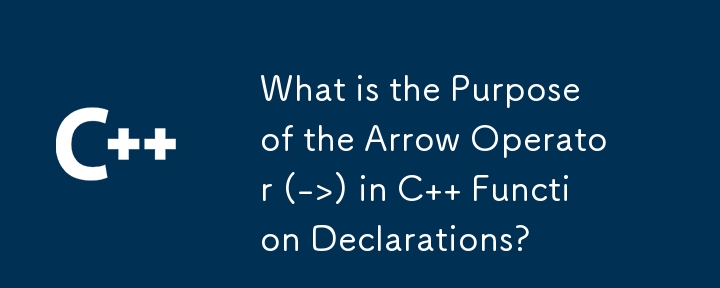Home >Backend Development >C++ >What is the Purpose of the Arrow Operator (->) in C Function Declarations?
What is the Purpose of the Arrow Operator (->) in C Function Declarations?
- Mary-Kate OlsenOriginal
- 2024-11-13 01:55:021083browse
 ) in C Function Declarations?
" />
) in C Function Declarations?
" />
Arrow Operator (->) in Function Heading
In modern C syntax, you may encounter the arrow operator (->) in the heading of a function declaration. This operator serves a distinct purpose in the context of generic programming.
Type Deduction with decltype
Arrow operator (->) is primarily used with the decltype keyword to deduce the return type of a function based on the types of its arguments. In the example code you mentioned:
template <typename T, typename T1>
auto compose(T a, T1 b) -> decltype(a + b) {
return a + b;
}
The arrow operator (->) is placed before the decltype expression. This indicates that the return type of the compose function is determined by evaluating the expression a b, where a and b are the function's arguments. In this case, the return type will be the result of the addition of a and b.
Syntax Overview
The syntax for function declarations using the arrow operator (->) is given below:
auto identifier(argument-declarations...) -> return_type;
Equivalent Form
The arrow operator syntax is equivalent to the traditional function declaration syntax:
return-type identifier(argument-declarations...);
However, the arrow operator syntax provides the benefit of automatically deducing the return type based on the function's arguments.
Advantages of Using Arrow Operator
Using the arrow operator (->) in function headings offers several advantages:
- Enhances code readability and concise writing.
- Eliminates the need for explicitly specifying the return type, reducing code verbosity.
- Maintains type safety, as the compiler performs deductions based on valid expressions.
Conclusion
The arrow operator (->) in function headings is a powerful tool for type deduction in C . It simplifies function definitions, reduces boilerplate code, and promotes code readability. By understanding the purpose and usage of the arrow operator, you can harness the strengths of generic programming in C .
The above is the detailed content of What is the Purpose of the Arrow Operator (->) in C Function Declarations?. For more information, please follow other related articles on the PHP Chinese website!
Related articles
See more- C++ compilation error: A header file is referenced multiple times, how to solve it?
- C++ compilation error: wrong function parameters, how to fix it?
- C++ error: The constructor must be declared in the public area, how to deal with it?
- Process management and thread synchronization in C++
- How to deal with data splitting problems in C++ development

